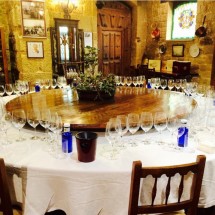Law Offices of John P. Connell, P.C.: Charitable organizations seeking to host fundraising events deriving proceeds from the sale of wine is a great way to attract donors, but the charity must comply with alcoholic beverage licensing requirements and applicable regulations.
The sale of wine at a charitable fundraiser falls within two distinct categories – Charity Wine Auction License (“CWAL”) and Charity Wine Pouring License (“CWPL”). The CWAL authorizes a non-profit organization to auction off bottles of wine during a fundraiser whereas a CWPL authorizes the sale of wine for consumption on the premises during such an event. Each license requires wine to be donated to the charity, without charge, and all proceeds from the sale of wine may only be used for the non-profit’s charitable purposes (An additional license – the Charity Partner Wine Pouring License – authorizes a charitable organization to partner with an existing licensee that may receive a limited amount of proceeds directly from the sale of wine, but distribution amounts may be scrutinized by the Alcoholic Beverages Control Commission – see below).
Every chartable wine fundraiser requires approval from the local licensing authority and Alcoholic Beverages Control Commission (the “ABCC”). The application must contain general information about the charity and event as well as confirmation the non-profit is organized under M.G.L. Chapter 180 (“Corporations for Charitable and Other Purposes”) via a Certificate of Good Standing from the Secretary of Commonwealth and Certificate of Solicitation from the Attorney General’s Public Charities Division. Names of donors and amounts of donated wine must also be disclosed within the application.
One particular issue of note is the location of the event. A charitable wine fundraiser may only be held at the charity’s principal place of business, headquarters or an alternate location with an existing license for on-premise or off-premise sale of alcoholic beverages. If the charity elects to host the event at the premises of an existing licensee (e.g. golf course, restaurant, etc.), the applicant must obtain a letter of consent from that particular licensee to be submitted with the application.
Charitable organizations hosting wine fundraisers should carefully track donations and proceeds. The ABCC has examined events after the fact for compliance, such as the case of In Re Nantucket Community Sailing, Inc. d/b/a Nantucket Community Sailing, Nantucket (ABCC Decision dated May 5, 2009). Here, the ABCC’s ex post facto review of a charitable organization and licensee’s joint event held under a Charity Partner Wine Pouring License found the licensee may have improperly received proceeds in excess of the allotted amount for hosting such an event. The ABCC did not sanction the Licensee, but required the charity to retain at least 51% of the gross proceeds from the sale of wine evidenced by a written agreement and revenue receipts. The ABCC further opined that any violations could negatively reflect the character and fitness of future applications. Therefore, it is important for both charitable organizations and Licensee entities to abide by the regulations and retain documentation of the same for such an event.
-Robert J. McGovern, Esq.

